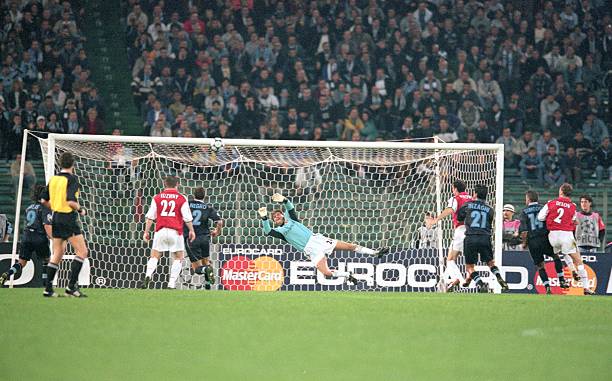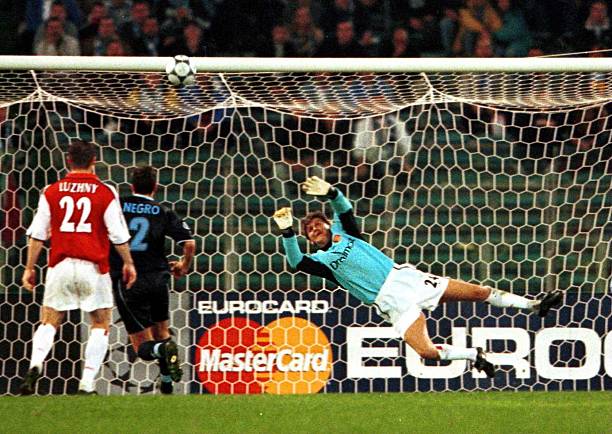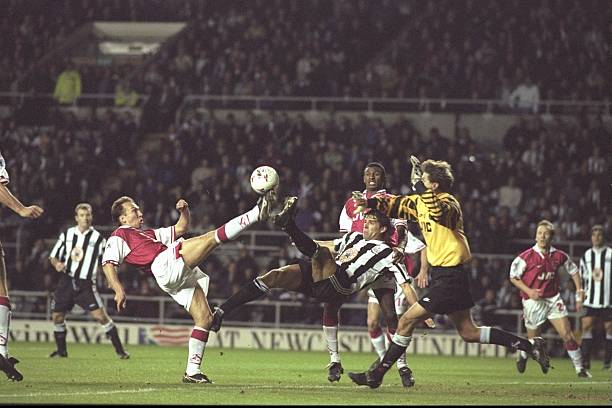Today is John Lukic’s 59th birthday, so we thought it a nice idea to look at one of Arsenal’s unsung heroes.
Down the decades, Arsenal fans have been spoiled with a succession of top-class goalkeepers but this seemingly unbroken alternation between club greats and journeymen since WWII doesn’t include one very notable exception – John Lukic

Jack Kelsey, Bob Wilson, Pat Jennings, David Seaman, Jens Lehmann, and perhaps now Petr Cech and Bernd Leno. It’s a long list but where is John Lukic?
Often the periods between these greats have been transitional, with a succession of lesser custodians reflected by a lack of credible title challenge. Though competent enough, names like Jim Standen, Jim Furnell, Jimmy Rimmer (3 Jims either side of Bob Wilson), George Wood, Manuel Almunia and even Wojciech Szczesny don’t inspire nostalgia and awe in quite the same way.
The lanky Yorkshireman with the Yugoslav surname was the undisputed first choice at Highbury for five years, hastening the retirement of Pat Jennings until finding himself unceremoniously replaced by David Seaman. Sandwiched between those two, it would be easy in retrospect to think that he was ‘keeping the seat warm’ for another top keeper, as we have seen in recent years under Arsene Wenger.
In reality, that couldn’t be further from the truth.
He was a very, very good goalkeeper in his own right, with shot-stopping, claiming crosses and prodigious goal-kicks his particular strengths.
Signed by Terry Neill in July 1983 for just £75,000, Lukic had already racked up just under 150 starts for recently relegated Leeds United, despite being only 22. He was earmarked as a potential long-term successor for Pat Jennings, and was essentially tasked with watching and learning from the big Ulsterman. And this is exactly what happened for 18 months.
It wasn’t until the new year of 1985, with Jennings already considering retirement, that Lukic made the Arsenal number 1 shirt his own. Once he did, he was to remain unchallenged, providing remarkably consistent and dependable service for just over half a decade.
Given the way his star was eclipsed so immediately by the peerless excellence of his successor, it is often forgotten what an important role John Lukic played in the construction of the legendary defence that was to serve the club so well for on average a decade after his departure. With only Tony Adams challenging his longevity in the first team, Lukic was an ever-present in the team during the first half of George Graham’s tenure, and his willingness to take responsibility helped him build an instant rapport with new arrivals Nigel Winterburn, Lee Dixon and Steve Bould.

Even before those arrivals, the team had started to evolve under Graham, initially through the likes of Adams, Rocastle, Thomas and Quinn cementing places in the first team.
“The young players were like a breath of fresh air as they don’t carry all that baggage around with them – it dragged the team forward from where it was. It was like a freshening up of a team that needed to take place, and it did at the right time.”
As this influx of youth began to cement itself, John played a key part in Arsenal breaking their 8-year trophy duck, with victory in the League Cup final of 1987, behind a back four of Adams, O’Leary, Sansom and Viv Anderson. Coming into the game as massive underdogs, the Gunners nearly buckled under early Liverpool pressure, and were indebted to an early brilliant save from Lukic low down to his right, denying Craig Johnston from close range. He could do nothing, however about Ian Rush’s opener, put on a plate for him by Steve McMahon after one of a succession of positional errors by captain Kenny Sansom.
Liverpool had never lost when Rush had scored, and it seemed the pundits’ pre-game predictions would be realised. But even in his first season, George Graham had instilled some of the fight that was to be hallmark of his teams, and just as they had against Spurs in the semi-final, Arsenal grew into proceedings, and eventually started to dominate. The introduction of another under-appreciated man, Perry Groves, proved the vital catalyst, and as we all know, ‘Champagne Charlie’ Nicholas got a scrappy deflected winner to go with his first half stabbed equaliser.

Lukic, like most of that squad, had won his first trophy. He was 26 and entering his prime, just as Arsenal were getting their act together after seven years of largely mediocrity post-Liam Brady.
“We got a little bit swept away with the cup run, as we’d not achieved a great deal prior to that in the time that I had been there. Then to get to the final…from memory the goals were bizzare…it’s almost like fate plays a part. “
With a return to Wembley in the same competition the following year, it seemed the good times were going to roll. Arsenal had made it to the final in a relatively comfortable procession, only to lose in extra time against massive underdogs Luton Town in a match best remembered for the end of Gus Caesar’s top flight career, and the start and end of any aspirations Nigel Winterburn had to be a penalty taker.
However, Lukic’s time in North London reached its highest point just a year later. He was ever present in an un-fancied Arsenal side that had already shocked the football world by leading the table into the championship run in, strictly following the old adage of ‘one game at a time’.
“We were very efficient that year. Very efficient. The wheels came off in the last few weeks, and everybody had written us off. You do in the broadest sense set out to win things, but in the realistic sense, you are out there to get results. We managed to get the results, we’d got a level of performance, we were playing really well, and we were at the top of the League with a chance of winning it. Only when it gets into the last six games of the season does it really become tangible, that you could win it.”

A trouncing of Norwich on 1st May and an away win at Middlesbrough put the Gunners firmly in the driving seat, only to falter, gaining only one point in the final two home games, as pressure and injuries kicked in. They found themselves faced with the task of winning their final game, away at reigning champions Liverpool, by two clear goals. This hadn’t happened in over three years. And Liverpool had already achieved an 18 point turnaround on Arsenal since the turn of the year, with an imperious run of form.
“Without a doubt (we thought we’d thrown it away), but then again, there’s that thing in football where you never say never. People had written us off going to Anfield, we were just turning up to make up the numbers because Liverpool were going to win the double that night… Well, we didn’t go into that game like that, and George wouldn’t have let us. We were there to do a job. When the final whistle went on that day, that is when the season finished. “
As you would expect, his memories of that day and night remain vivid.
“We were quite relaxed (on the coach up to Liverpool). Everybody was reading newspapers, writing us off, and we were all having a laugh and a joke. The members of the squad who liked a bet were thinking, well, there’s good odds here! We didn’t feel any pressure at all that night. Liverpool had conceded two goals at home on something like three occasions in the previous nine years. We had an appalling record at Liverpool. God knows how many years it was since we’d won there, so factor in that, we’ve got no pressure have we! We’re not expected to win, they’re not going to concede two goals, so hey, what have we got to lose…”
Eyebrows were raised when George Graham started with three central defenders in a game where Arsenal needed to score at least twice, but Lukic confirmed what we’ve heard elsewhere, that the manager had it all worked out.
“George’s team meeting at the hotel was exactly the script that panned out that night, almost word for word. It was uncanny! His game plan came to fruition, bizarrely! Take to halftime, nil-nil, come out in the second half and press a little further forward, hopefully, nick a goal early on. They’ll panic, start feeling the nerves, and towards the back end of the game, go on and get the winner.”
So Lukic and the other members of that night’s back six, kept their focus throughout, very much in the image of their manager’s ideals.

“(when Alan Smith scored) You’ve still got a job to do. You’ve only got half the job done. You can’t afford to concede, doubly now, because you’ve got a foothold in the game, almost a hand on the trophy itself, so now if you concede, on the night would have been devastating. So it was crucial to keep the concentration and keep a clean sheet.”
And they did, as history was made in the most dramatic fashion. And lest we forget, a small contribution though it was, it was Lukic who started that goal, throwing the ball out to Dixon (“an executive decision! To develop the expansive style of football that The Arsenal play today!”) in what was indeed ‘surely the last attack of the game’. The rest we all know and Thomas became immortal.
“He’d had a chance a few minutes earlier. But for me, if you had asked me which individual I would want in that position at that moment in time, then it would have been Mickey. Simply because Mickey was so laid back he didn’t have a pulse…it’s surreal because you are watching events unfold and thinking ‘well go on Mick, go on Mick, go on Mick, and Mick does, and the rest as they say…”
Even then, as Michael Thomas was doing headspins in front of the away fans, the calm head on still relatively young shoulders at the other end prevailed – at least for a while;
“I was at the Kop end and wasn’t sure how they’d react to me leaping about, so I decided to be constrained – then went mad afterwards.”
“The only sad thing was that we were so far from home. We were three hours away, and with people out on the streets…it would have been nice if we could have won it at Highbury. We made our way back to London, and a few of the lads did what we did best in those days – went out and had some fun!””
Though it was the most important goal that season to start in the hands of John Lukic, it was not the first. Rather more often hand was followed by large boot, transferring the ball from one penalty area to another, with messers Smith, Hayes and Merson all profiting at different times.
Lukic had no bones about crediting George Graham’s coaching with the team’s upswing in fortunes, even if he did say the manager’s style was ‘dictatorial’.
“It focused your attention because the attention was to detail. Whatever the back four were doing, you weren’t just stood behind them, twiddling your thumbs, because you were an integral part; and the finger got pointed, and quite severely if needs be. So you could never rest on your laurels.”
“Me and George had a relationship, and its important to have a mutual respect, no matter who you work for, whether you like them or not, and I certainly had that, because I think George played a big part in the achievements of the football club in the late ’80s, going into the early 90s.”
And the respect was indeed mutual.
“When I joined the club [as manager], I always had great belief in John Lukic, who was a big favourite with the Arsenal crowd.” – George Graham
But this didn’t stop the manager from showing his ruthless side.
George Graham confirmed his intentions to sign David Seaman, with a deal falling through on transfer deadline day in March 1990 (initially attempting to send Lukic on loan to QPR in return). John’s popularity with the fans was confirmed by not only a range of terrace chants in his support but also a small protest demonstration outside the ground.
“I was overwhelmed to be honest with you. It’s one of those things you can’t put into words. It helped me get through the last period of that season. From that moment (when the signing of Seaman initially fell through), the fans were with me, supported me, which was a fantastic thing for me. It was quite moving when I left, particularly with the support of the fans, and that lives on.”
This was primarily due to his consistency of high-level performances, but wasn’t hurt by his willingness to give home fans in the Clock End and North Banks a wave if requested. And of course, I am lucky enough to be of the vintage to remember “Johnny, Johnny, do the twist” at goal kicks.
When it became clear that his only future at the club was as an understudy, Lukic returned to Leeds in May 1990 for £1m, which at the time marked a handsome profit.
“I never wanted to leave. I knew the writing was on the wall. But hey, that’s football. You can’t cry over spilt milk. It was an easy decision, but a hard decision at the same time. Well, it wasn’t a decision really. I knew I had to go. It was hard to leave…”
It is rare for a player to essentially be forced out of a club where he is happy and popular and successful without recrimination resting on either party. Lukic left with his head held high, his reputation intact and at the peak of his powers, and the manager was entirely vindicated in his desire to replace him, as Lukic readily concedes.
“To be fair when David came in after me…I really haven’t got to say a great deal as far as that’s concerned…what a fantastic goalkeeper, and what fantastic success came with that signing.”
On his departure, Graham famously commented: “I still think John Lukic is one of the best keepers in the country; I just think David Seaman is the best“. He was to be proved right on both counts.
Back at Elland Road, where almost a decade before his form had effectively been the reason the young Dave Seaman left, he enjoyed further success.
“I went back to a football club…I perhaps thought I did owe them something, and when I went back we managed to right a wrong from my point of view…when we won the league at Leeds.”
Having no doubt experienced mixed emotions watching his former team-mates canter to the League Title the following season, back-stopped magnificently by his replacement, he then enjoyed what was probably the greatest season of his career on a personal level, winning the 1992 League Championship at his boyhood club, again as an ever-present.
Four years later, at the age of 35, he returned to Arsenal as back-up to his old rival, and when Seaman was injured even managed to get a couple of runs in the side, including Arsenal’s first home win in the North London derby in five years. The following season he found himself supplanted as deputy to our able Seaman by the short-lived excellence of Alex Manninger. Perhaps surprisingly for a goalkeeper of his quality and experience, he decided to stay on Arsenal’s third-choice goalkeeper until as late as the summer of 2001, when he retired, aged 40, after 296 appearances for the club over two spells. He made four appearances in that final season, only conceding once, away at Lazio. At the time, that made him the oldest ever player in the Champions League, at 39 years and 11 months. A 5-0 home win over Manchester City also marked him as one of only four players to have appeared in the English top flight in four separate decades. The others? Peter Shilton and Sir Stanley Matthews. And, er… Steve Ogrizovic.
John is now a freelance goalkeeping coach, including work at Arsenal, and tours the country as an after-dinner speaker. His son, also John, was briefly a professional goalkeeper in the lower leagues.
Ultimately, it’s hard to know where to place him in the Arsenal pantheon. He was never considered the best in the country, never played for England, and was flanked by two men who were in the top three in the world at their peaks. But equally, he won more League titles in his career than any post-war Arsenal keeper bar David Seaman, and provided the stability needed to bring The Gunners back to the top of the tree after 18 years in the slipstream of others.
Perhaps the final word should go to John’s old goalkeeping coach, Bob Wilson, who, having won trophies and subsequently coached Pat Jennings and David Seaman, knows a bit about keepers:
“John Lukic, I put up with the greats, “

